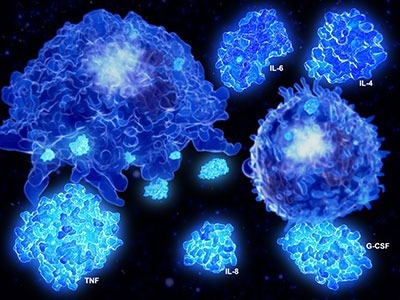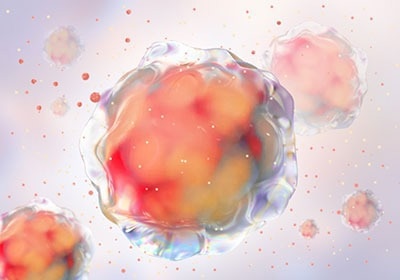Cytokines are small, secreted proteins able to pass messages between cells. Members of this superfamily include growth factors, interleukins, chemokines, interferons, colony-stimulating factors, and tumor necrosis factors (TNF).1
Cytokines are produced by a wide range of cell types, including immune cells. In this instance, these molecules are able to act on the cells that generate them or nearby cells.
When bound to their surface receptors, cytokines trigger downstream signaling cascades linked to many cellular processes. These processes include differentiation, tissue repair, migration, proliferation, and immune responses.1
The ability of these proteins to affect diverse pathways has prompted researchers to investigate their involvement in an array of diseases, including cancer, inflammatory disorders, and autoimmune diseases. This research has confirmed that cytokine dysregulation contributes to the disease’s pathogenesis.
Cancer drug targets or potential therapies
Research has highlighted that the overexpression of specific cytokines or their receptors in cancer cells promotes excessive proliferation, expansion, and resistance to therapies. These include TNF, interleukin-6 (IL-6), IL-6 receptor, interleukin-1β (IL-1β), and interleukin-1 receptor.1
Malignant cells’ increased cytokine secretion also recruits stromal and immunosuppressive cells to the tumor site, resulting in new blood vessel generation, elevated extracellular matrix production, and immune evasion.
These characteristics enable cancer cells to generate their optimal tumor microenvironment (TME), supporting cancer cell growth while hindering antitumor immune activity.
Researchers working to overcome cytokine dysregulation in cancer have devised a range of strategies to induce protective antitumor immune responses and neutralize protumor cytokine activities.
Antagonists, such as monoclonal antibodies, small molecule inhibitors, and cytokine traps have been developed to limit cancer progression. These work by directly binding to cytokines or their receptors, blocking the activation of specific signaling pathways.2
Mogamulizumab is the monoclonal antibody against CC chemokine receptor 4, and this has shown potential to treat a range of cancers, including lung cancer, adult T-cell leukemia-lymphoma, and cutaneous T-cell lymphoma.3

Because abnormal cytokine levels in the tumor microenvironment drive cancer pathogenesis, scientists are currently generating therapies targeting these proteins. Image Credit: ©ISTOCK.COM, SELVANEGRA
Abnormal cytokine levels in the tumor microenvironment drive cancer pathogenesis, requiring therapies to target these proteins.
Cytokines have also been directly employed as therapies, including interferon-α (IFN-α) and interleukin-2 (IL-2). The intravenous administration of recombinant cytokines has allowed clinicians to increase their levels in the TME to promote cancer cell apoptosis or immune stimulation.
Cytokines suffer from short circulatory half-lives that can potentially affect malignant and normal cells. This leads to off-target effects and toxicity.4
This has led to researchers investigating new means of improving cytokine delivery to the tumor, including designing nanoparticles to carry the molecules, the fusion of cytokines to antibodies or other proteins, or employing tumor-homing mesenchymal stem cells able to express the therapeutic cytokines.
Clinicians have also begun employing cytokine or cytokine antagonists alongside existing cancer therapies to enhance their efficacy and help minimize their adverse effects.1
These proteins also produce cellular therapies outside of their use in cytokine-based/directed treatments. For example, researchers may leverage cytokines, such as IL-2, interleukin-7 (IL-7), interleukin-15 (IL-15), and interleukin-21 (IL-21) to culture immune cells for cancer immunotherapies. These immune cells include tumor-infiltrating lymphocyte (TIL) and chimeric antigen receptor (CAR) T-cell therapies.1

Researchers rely on recombinant cytokines for immune cell culture and immunotherapy generation. Image Credit: Sino Biological Inc.
Selecting high-quality cytokines for research and clinical applications
Scientists investigating the importance of particular cytokines to cancer pathogenesis and antitumor immune activity rely on the availability of safe and high-quality cytokines. These are also critical to scientists developing immunotherapies or anti-cytokine therapies for cancer treatment.
Sino Biological boasts an extensive range of over 800 cytokine products, including recombinant cytokines like IFN-α, IL-1β, IL-2, IL-6, IL-7, IL-15, IL-21, and TNF, from a range of species, including mice, rats, and humans.
The company employs stringent quality control processes to assess purity, sterility, endotoxin levels, and the presence of mycoplasma, ensuring that its research-grade products exhibit high purity, stability, bioactivity, and consistency between batches.
This commitment to product quality ensures that researchers can obtain trustworthy research results.
Sino Biological also offers a range of even higher quality and stable recombinant cytokines produced in accordance with good manufacturing practice (GMP) standards. This extremely strict manufacturing process ensures that these GMP-grade cytokines boast excellent safety profiles, making them ideally suited to cell therapy development, including CAR T and TIL therapies.
References and further reading
- Propper, D.J. and Balkwill, F.R. (2022). Harnessing cytokines and chemokines for cancer therapy. Nature Reviews Clinical Oncology, 19(4), pp.237–253. https://doi.org/10.1038/s41571-021-00588-9.
- Berraondo, P., et al. (2019). Cytokines in clinical cancer immunotherapy. British Journal of Cancer, [online] 120(1), pp.6–15. https://doi.org/10.1038/s41416-018-0328-y.
- Zhang, T., et al. (2021). Safety and efficacy profile of mogamulizumab (Poteligeo) in the treatment of cancers: an update evidence from 14 studies. BMC Cancer, 21(1). https://doi.org/10.1186/s12885-021-08363-w.
- Deckers, J., et al (2023). Engineering cytokine therapeutics. Nature Reviews Bioengineering, 1(4), pp.286–303. https://doi.org/10.1038/s44222-023-00030-y.
Acknowledgments
Produced from materials originally authored by Sino Biological.
About Sino Biological Inc.
Sino Biological is an international reagent supplier and service provider. The company specializes in recombinant protein production and antibody development. All of Sino Biological's products are independently developed and produced, including recombinant proteins, antibodies and cDNA clones. Sino Biological is the researchers' one-stop technical services shop for the advanced technology platforms they need to make advancements. In addition, Sino Biological offer pharmaceutical companies and biotechnology firms pre-clinical production technology services for hundreds of monoclonal antibody drug candidates.
Sino Biological's core business
Sino Biological is committed to providing high-quality recombinant protein and antibody reagents and to being a one-stop technical services shop for life science researchers around the world. All of our products are independently developed and produced. In addition, we offer pharmaceutical companies and biotechnology firms pre-clinical production technology services for hundreds of monoclonal antibody drug candidates. Our product quality control indicators meet rigorous requirements for clinical use samples. It takes only a few weeks for us to produce 1 to 30 grams of purified monoclonal antibody from gene sequencing.
Sponsored Content Policy: News-Medical.net publishes articles and related content that may be derived from sources where we have existing commercial relationships, provided such content adds value to the core editorial ethos of News-Medical.Net which is to educate and inform site visitors interested in medical research, science, medical devices and treatments.